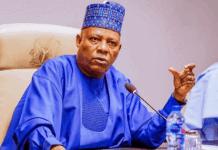The black market exchange rate closed negative on the 31st of March 2022 at N587/$1.
Despite the CBN’s various interventions, the Naira has Crashed Massively and is now closer to N600/$1.
Despite the Central Bank of Nigeria’s several interventions to safeguard the Naira, the currency depreciated by N22 in the first quarter of 2022.
The naira-US dollar exchange rate has stayed unchanged at N417/$1 on the official Investors and Exporters (I&E) market. On the other hand, the black market has maintained its bearish trend, pushing the currency closer to N600/$1.
The Central Bank has imposed a slew of regulations to protect the Naira, ranging from forbidding the sale of dollars to BDCs to banning the broadcast of black market rates on AbokiFX.
Recall that the Naira depreciated against the US dollar in the parallel market, closing at N565/$1 on December 31, 2021, compared to N460/$1 at the end of 2020. Similarly, on March 31, 2022, the black market exchange rate closed negative at N587/$1, showing a N22 depreciation as compared to the N565/$1 on December 31, 2021. Ejes Gist Newspaper reports that the CBN moved the Naira for Dollar scheme from the IMTOs to the IEFX window in February 2022.
The CBN issued guidelines stating that for every US dollar repatriated and sold at the Investors and Exporters Window, it will enable a payment of N65.
The CBN’s declared goal for the RT200 Program is to raise $200 billion in non-oil foreign exchange earnings over the next five years to preserve Naira’s value. The Naira is facing further depreciation as a result of dividends paid by large companies in the local equities market to their shareholders, which includes international investors seeking to repatriate their cash. GTCO, Zenith Bank, Dangote Cement, Lafarge Africa, Access Bank, Nigerian Breweries, and MTN Nigeria, to name a few, have all issued final naira dividends for the fiscal year 2021.
The Naira exchange rate is influenced by inflationary pressures, the inflation rate differential, balance of trade issues, foreign reserves balances, interest rate differentials, and other factors. The DMO recently responded to an inquiry on whether FG could receive crude oil exports in Naira. According to the Debt Management Office (DMO), the steps will result in a decrease in Nigeria’s external reserves and currency value.





















